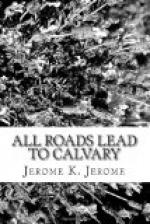“Whether we accept the miraculous explanation of Christ’s birth,” continued Mr. Simson, in his best street-corner voice, “or whether, with the great French writer whose name for the moment escapes me, we regard Him merely as a man inspired, we must, I think, admit that His teaching has been of help: especially to the poor.”
The fanatic turned upon him so fiercely that Mr. Simson’s arm involuntarily assumed the posture of defence.
“To the poor?” the old man almost shrieked. “To the poor that he has robbed of all power of resistance to oppression by his vile, submissive creed! that he has drugged into passive acceptance of every evil done to them by his false promises that their sufferings here shall win for them some wonderful reward when they are dead. What has been his teaching to the poor? Bow your backs to the lash, kiss the rod that scars your flesh. Be ye humble, oh, my people. Be ye poor in spirit. Let Wrong rule triumphant through the world. Raise no hand against it, lest ye suffer my eternal punishments. Learn from me to be meek and lowly. Learn to be good slaves and give no trouble to your taskmasters. Let them turn the world into a hell for you. The grave—the grave shall be your gate to happiness.
“Helpful to the poor? Helpful to their rulers, to their owners. They take good care that Christ shall be well taught. Their fat priests shall bear his message to the poor. The rod may be broken, the prison door be forced. It is Christ that shall bind the people in eternal fetters. Christ, the lackey, the jackal of the rich.”
Mr. Simson was visibly shocked. Evidently he was less familiar with the opinions of The Rationalist than he had thought.
“I really must protest,” exclaimed Mr. Simson. “To whatever wrong uses His words may have been twisted, Christ Himself I regard as divine, and entitled to be spoken of with reverence. His whole life, His sufferings—”
But the old fanatic’s vigour had not yet exhausted itself.
“His sufferings!” he interrupted. “Does suffering entitle a man to be regarded as divine? If so, so also am I a God. Look at me!” He stretched out his long, thin arms with their claw-like hands, thrusting forward his great savage head that the bony, wizened throat seemed hardly strong enough to bear. “Wealth, honour, happiness: I had them once. I had wife, children and a home. Now I creep an outcast, keeping to the shadows, and the children in the street throw stones at me. Thirty years I have starved that I might preach. They shut me in their prisons, they hound me into garrets. They jibe at me and mock me, but they cannot silence me. What of my life? Am I divine?”
Miss Ensor, having finished her supper, sat smoking.
“Why must you preach?” she asked. “It doesn’t seem to pay you.” There was a curious smile about the girl’s lips as she caught Joan’s eye.




